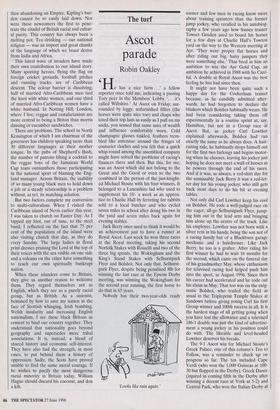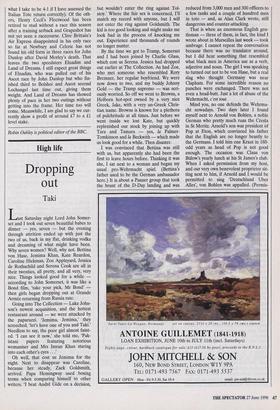The turf
Ascot parade
Robin Oakley
e has a nice farm a fellow
H
reporter once told me, indicating a passing Tory peer in the Members' Lobby, `... it's called Wiltshire.' At Ascot on Friday, sur- rounded by leggy, unfurnished fillies (the horses were quite nice too) and chaps who toted their top hats as easily as I pull on my socks, you sensed that same aura of wealth and influence comfortably worn. Cold champagne glasses tinkled, feathers trem- bled like antennae around the fringes of couturier cloches and you felt that a quick whip-round among the assembled company might have solved the problems of racing's finances there and then. But this, for me, was an Ascot which did not belong to the Great and the Good or even to the two combined in the person of the just-knight- ed Michael Stoute with his four winners. It belonged to a Lancashire lad who used to supplement his 10/- a week as an appren- tice to Charlie Hall by ferreting for rabbits sold to a local butcher and who cycled seven miles to school after doing his two in the yard and seven miles back again for evening stables.
Jack Berry once used to think it would be an achievement just to have a runner at Royal Ascot. Last week he won three races at the Royal meeting, taking his second Norfolk Stakes with Rosselli and two of the three big sprints, the Wokingham and the King's Stand Stakes with Selhurstpark Flyer and Bolshoi. Not only that. Selhurst- park Flyer, despite being penalised 81b for winning the last race at the Epsom Derby meeting, was winning the Wokingham for the second year running, the first horse to do that in 65 years.
Nobody has their two-year-olds ready `Looks like rain again.' sooner and few men in racing know more about training sprinters than the former jump jockey, who recalled in his autobiog- raphy a few years ago how Sussex trainer Towser Gosden used to board his horses for a few days at Charlie Hall's Towton yard on the way to the Western meeting at Ayr. 'They were proper flat horses and after riding our big, hairy jumpers they were something else.' That bred in him an ambition to win the Ayr Gold Cup, an ambition he achieved in 1988 with So Care- ful. A double at Royal Ascot was the best feeling he has had since then.
It might not have been quite such a happy day for the Cockerham trainer because, as he candidly admitted after- wards, he had forgotten to declare the blinkers which Bolshoi habitually wears. He had been considering taking them off experimentally in a routine sprint at, say, Hamilton, but not in a Group race at Ascot. But, as jockey Carl Lowther explained afterwards, Bolshoi had run exactly the same as he always does. A hair- raising ride, he habitually drops himself out for the first two furlongs and begins motor- ing when he chooses, leaving his jockey just hoping he does not meet a wall of horses as he powers through the end of his races. And if it was, as always, a red-shirt day for the unmissable Jack Berry it was a red-let- ter day for his young jockey, who still gets back most days to do his bit at evening tables.
Not only did Carl Lowther keep his cool on Bolshoi. He rode a well-judged race on the eager, all-go Selhurstpark Flyer, jump- ing him out in the lead arm and bringing him alone up the centre of the track. Like his employer, Lowther was not born with a silver rein in his hands, being the son not of a racing family but of a Blackburn garage mechanic and a hairdresser. Like Jack Berry, he too is a grafter. After riding his first winner he had to wait 16 months for the second, which came on the funeral day of his grandmother May, whose enthusiasm for televised racing had helped push him into the sport, in August 1996. Since then his career had accelerated and he rode out his claim in May. That too was on the enig- matic Bolshoi, who trailed the field as usual in the Tripleprint Temple Stakes at Sandown before giving young Carl his first Group winner and 100th success in all. It is the hardest stage of all getting going when you have lost the allowance and a televised 186-1 double was just the kind of advertise- ment a young jockey in his position could do with. The likeable and level-headed Lowther deserves his breaks.
The 9-1 Ascot win for Michael Stoute's Greek Palace, one of this column's Ten to Follow, was a reminder to check up on progress so far. The ten included Cape Verdi (who won the 1,000 Guineas at 100- 30 but flopped in the Derby), Greek Dance (injured in coming fifth in the Derby after winning a decent race at York at 5-2) and Central Park, who won the Italian Derby at what I take to be 4-1 if I have assessed the Italian Tote return correctly). Of the oth- ers, Henry Cecil's Fleetwood has been retired to stud without a race this season after a training setback and Grapeshot has not yet seen a racecourse. Clive Brittain's Air Express disappointed in his only race so far at Newbury and Celeric has not found his old form in three races for John Dunlop after David Morley's death. That leaves the two speedsters Elnadim and Land of Dreams. I still expect great things of Elnadim, who was pulled out of his Ascot race by John Dunlop but who fin- ished third to Bolshoi and Ascot second Lochangel last time out, giving them weight. And Land of Dreams has showed plenty of pace in her two outings without getting into the frame. Her time too will come. Meanwhile, I am glad to say we cur- rently show a profit of around £7 to a £1 level stake.
Robin Oakley is political editor of the BBC.



























































 Previous page
Previous page